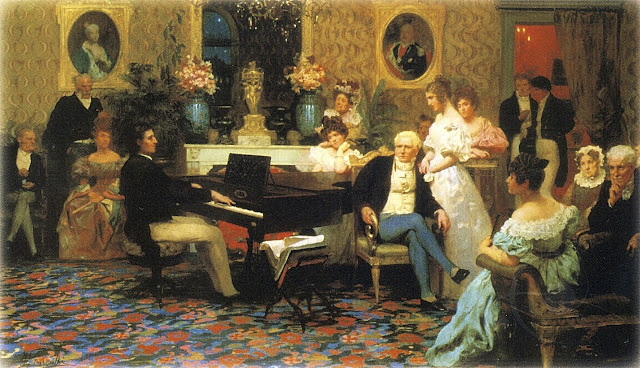Chopin and his 'espaces imaginaires' - The Fortress of Venus - An escapist thought in these disordered times
The Fortress
of
Venus
Michael Moran
Michael Moran
In the summer of 1844 Chopin was at Nohant with George Sand, her children, his sister Ludwika Jędrzejewicz and his sister's husband Kalasanty.
After they left to return to Warsaw he wrote a letter to her expressing his sense of loss at her departure:
'I feel strange this year [...] but I am not at all here at this moment, only as usual in some strange space. This must be espaces imaginaires, but I am not embarrassed by it.'
It is now exactly 50 years since I left civilization as a young man and went to live on a South Pacific Island. I took with me my C. Bechstein upright grand piano and a great deal of the music of Fryderyk Chopin. I intended, among other escapist tendencies, to practice and realize the utterly false hope of turning myself into a concert pianist.
As much of the world is now living in strange and unaccustomed isolation during one of the greatest catastrophes mankind has experienced, I thought during this unaccustomed dislocation of time, you may like to while away a couple of hours reading about my time spent in this exotic spot. Frycek was always a constant companion of my own espaces imaginaires in those days to which I seem to have been forced to return.
Well, as a writer, this is my modest contribution and possibly escapist diversion for you during these lonely and psychologically stressful times.
Well, as a writer, this is my modest contribution and possibly escapist diversion for you during these lonely and psychologically stressful times.
The Fortress of Venus is a complex blend of historical novel and modern drama, a tale of two forbidden loves. Paul, a young concert pianist inordinately fond of the music of Chopin, experiences a lyrically erotic relationship with the mysterious island woman Poema. She is a descendant of one of the H.M.S Bounty mutineers who had been settled there by Queen Victoria from Pitcairn Island. Their love is acted out amidst the lush tropical scenery.
Later he discovers a secret journal kept by Paulina, the cultured wife of a brutal Commandant of the nineteenth century penal station. This was the terrifying function of the island in the early nineteenth century. He reads of her breathless passion for a young Polish cavalry officer stationed at the military garrison - an affair painfully conducted in the shadow of the gallows.
Later he discovers a secret journal kept by Paulina, the cultured wife of a brutal Commandant of the nineteenth century penal station. This was the terrifying function of the island in the early nineteenth century. He reads of her breathless passion for a young Polish cavalry officer stationed at the military garrison - an affair painfully conducted in the shadow of the gallows.
In this interwoven story, the menace of the days of cruelty and degradation are finely balanced against the sensuality and innocence of contemporary island life.
The Fortress of Venus is a meticulously researched and powerful narrative. With its structure inspired by the pagan mysteries of love depicted in the Renaissance painting Primavera by Botticelli, this intense novel transports the reader to an exotic realm of seductive yet sinister beauty.
Here is the link to a PDF file of my recent revision of this historical novel. Set on that idyllic island, it was successfully published many years ago, always with the music of Chopin as a companion.
Tahiti Revisited (1776)
William Hodges (1744-1797) Greenwich Maritime Museum
Here is the link to a PDF file of my recent revision of this historical novel. Set on that idyllic island, it was successfully published many years ago, always with the music of Chopin as a companion.
Free download
https://app.box.com/s/n1k57k0yi3a9xb1x2ohsjrwm9nn46u0o (Word Document)
or
https://app.box.com/s/fk2si370c4qbhg9fd3ajwnrbkje652a3 (PDF)
or
https://app.box.com/s/fk2si370c4qbhg9fd3ajwnrbkje652a3 (PDF)
I hope to further set down here my future explorations and thoughts that arise in my own musical espaces imaginaires cultivated now in Warsaw, Chopin's home as a young man, during The Year of the Crown Virus.





Comments
Post a Comment